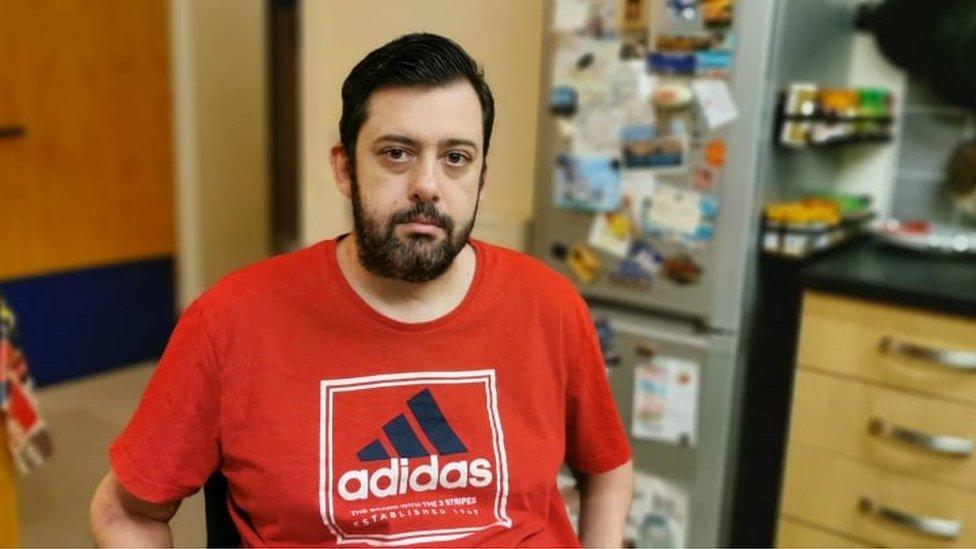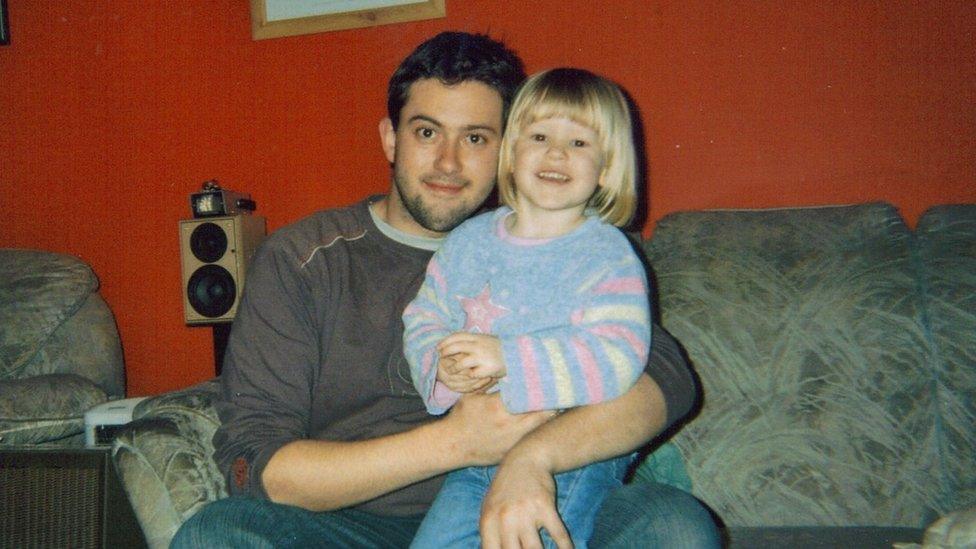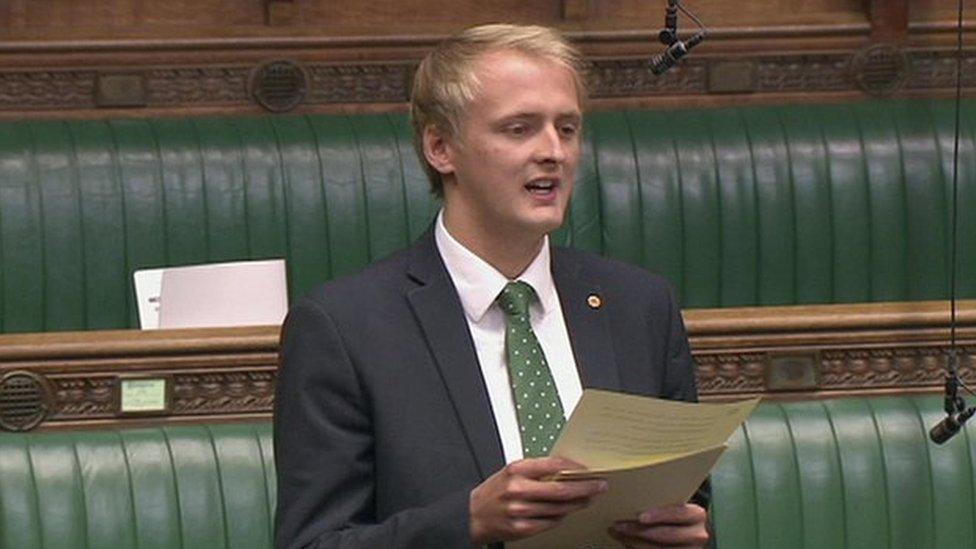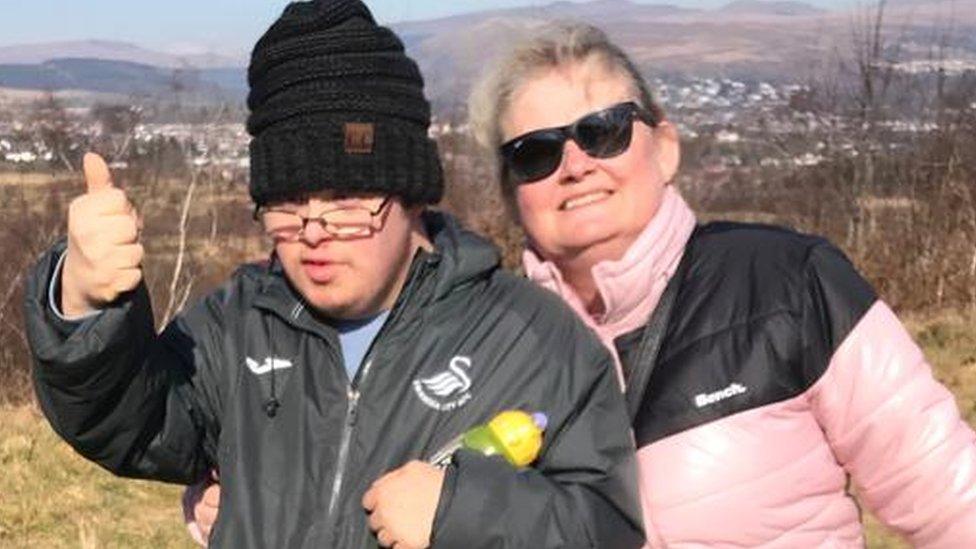Energy bills: Paralysed dad fears he may lose adapted home
- Published
Dave Davies fears he could lose his home built especially for him as energy costs soar
A paralysed man has said he is worried he could lose the home built especially for him as energy costs soar.
Dave Davies, 39, broke his neck 16 years ago and monthly energy bills at his custom-built bungalow in Lampeter, Ceredigion, have doubled since October.
Charity Citizens Advice said the impact of the cost of living crisis on disabled people "cannot be overstated".
The UK government said it recognised the issues people were facing and it was taking decisive action.
The Welsh government wants the UK government to take "urgent action" and said it was doing "all it could" to help families.
Mr Davies was injured after diving into shallow water in New Quay, Ceredigion, in 2006, and had to give up his job in a fish factory. He relies on 24-hour carers and benefits to pay rent and bills.
Neurological complications mean Mr Davies, a dad-of-two, cannot regulate his own temperature and must have his home heated to 24C (75F) so his health does not decline.
His skin is also hypersensitive, meaning heavy materials, such as jumpers, "feel like sandpaper".

Mr Davies' bills have risen from £150 to £300 since October
With such a large jump in his bills already, news that the energy regulator Ofgem is raising the price cap by 54% from April has left Mr Davies fearing he may be paying £450 per month from the spring, three times what he was paying last year.
He said: "How do people like us survive when this increase goes even more? I just don't know. And how it makes me feel - just gobsmacked really that they're allowing this to happen.
"For people in my position, we unfortunately have to rely on what the government gives us. But that's not going up. Nothing is going up. We can't just go and earn an income, we can't just go and get a job. We're stuck."
Mr Davies said UK and Welsh government schemes designed to help would amount to about a month's worth of energy bills.

Mr Davies and his daughter, Star, before his accident in 2006
He has started using credit cards to pay for heating, and is borrowing money from family. Money he had been saving to fix the electric wheels on his wheelchair now has to go on bills.
He said: "It's just kicking the can further down the road because with credit cards there's interest but you have to cover things for the now. I just don't know, I don't know what's going to happen in the future."
Morgan Wild, head of policy at Citizens Advice, said: "The impact on disabled people cannot be overstated for the cost of living crisis.
"So, 60% of people who received advice from us around fuel or fuel debts have a disability or a long-term health condition... making sure social security is adequate and that we are protecting these people enough is crucial."
Meanwhile, the Trussell Trust said six in 10 people who use foodbanks are disabled.

Ceredigion MP Ben Lake called for more help for people such as Mr Davies
Mr Davies' MP, Ben Lake of Plaid Cymru, said it was a "worrying situation" and called for more help for disabled people.
"These one-off payments don't really touch the sides," he said.
"The fact we have a series of different schemes, each with their own set of qualifying criteria, each with their own set of application processes makes it quite complicated. So I would like to see both governments devising a way of making it far simpler and more streamlined."
The UK government said it recognised people were facing pressures because of the cost of living and it was taking decisive action through its schemes.
The Welsh government said it was "doing all we can, with the resource and powers available to us, to help Welsh families, households and communities through these difficult times".
It added it was continuing to "call on the UK government to take urgent action to safeguard the most vulnerable in our society from this crisis".
- Published16 February 2022

- Published17 February 2022

- Published15 February 2022

- Published2 February 2022

- Published2 February 2022
